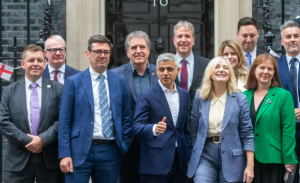Ihave long felt Labour’s 2024 moment would prove more significant for the running of the country than its 1997 moment – and so it has already proved. The historic gathering of England’s mayors with the new prime minister and deputy prime minister around the cabinet table on Tuesday, just a few days after the election, confirms that the 2024 to 2029 parliament is going to be different to any that has gone before it.
At the very start, the clearest of instructions has been sent directly into the heart of the Whitehall system: the devolution of power can no longer justifiably be resisted. If the new government is going to generate the economic growth it needs in all parts of the UK, its regions and nations must be empowered with immediate effect.
The new council for regions and nations is the gamechanger for which we have been patiently waiting. It will mean that Whitehall departments will have to talk to us as equal partners in the running of the country, rather than talk down to us as they have long had a tendency to do.
If I played back some of the things said to me over the past seven years, it wouldn’t reflect well on how the centre of government regards the rest of the country outside London and the south-east. There were times when unfair decisions were foisted on us and we didn’t even get a proper hearing – such as the imposition of tier 3 restrictions during the pandemic and the cancellation of HS2. A number of Whitehall departments continue to resist our devolution ambitions.
To be fair, however, the Ministry of Housing, Communities and Local Government has been hugely supportive. And, encouragingly, the Treasury, initially helpful under George Osborne, has recently swung behind the agenda again. Maybe the latest data has been changing their minds.
Improving productivity outside London has long been regarded as something of a holy grail. Two weeks ago, Jim O’Neill, a minister in Osborne’s Treasury, gave a fascinating interview on the BBC’s Today programme in which he pointed to the fact that productivity is rising three times faster in Greater Manchester than in London. The catalyst for this change? Devolution.
This is why, for a new government with a growth mission, the devolution of power has suddenly become mission-critical. There are things mayors can do that ministers can’t.
Ministers can of course set a housing target of 1.5m new units within a parliament. But they can’t turn that target into good homes in liveable places that are ready for growth.
I remember well the last Labour government’s housing pathfinders programme. It was not short of good intentions for the communities it was trying to help. But redesigning those communities from Whitehall, and the subsequent bulldozing of swathes of Victorian terraced housing in parts of the Midlands and the north, was never going to work.
This is a vivid illustration of why the 2024 moment is more promising than the 1997 one. Back then, our overly centralised country wasn’t set up for regional regeneration. Now we have 12 mayors leading capable combined authorities that can join the dots between housing, transport and skills, and turn Whitehall targets into coherent, inclusive growth on the ground.
At the meeting with the prime minister on Tuesday, every mayor stressed the importance of an all-age technical education system to the government’s growth mission. But they also expressed frustration at the failure of the Departments for Education and Work and Pensions to embrace the devolution journey.
As things stand, the single biggest risk to the government’s growth ambition is a schools system overly focused on the university route and an incoherent and fragmented skills landscape beyond it. It is simply not set up to move fast enough to meet the changing needs of Greater Manchester’s dynamic economy.
We are on our own mission to change that.
Today we will gather employers and schools to agree the next phase of the development of the Greater Manchester baccalaureate (MBacc): an equal alternative to the university route for young people growing up in Greater Manchester.
The MBacc will give them a clear line of sight into the Greater Manchester economy and structured pathways towards the opportunities we have. At 14, they will be given clear information on the GCSEs employers most value. At 16, they will be guided towards seven gateways into the most successful parts of our economy and given a guarantee of a quality work placement linked to technical qualifications such as T-levels and Btecs. If we get this right, the two-thirds of young people in Greater Manchester who don’t take the university route will suddenly have an education system that works for them too. Imagine the power of that.
In the space of one week, our new government has changed the weather and lifted the mood of the nation. Things are finally moving forward again. For the mayors, Whitehall doors that were slammed shut are suddenly springing open. It already feels like a new age of possibility and the dawn of a golden era for English devolution.
The Guardian

